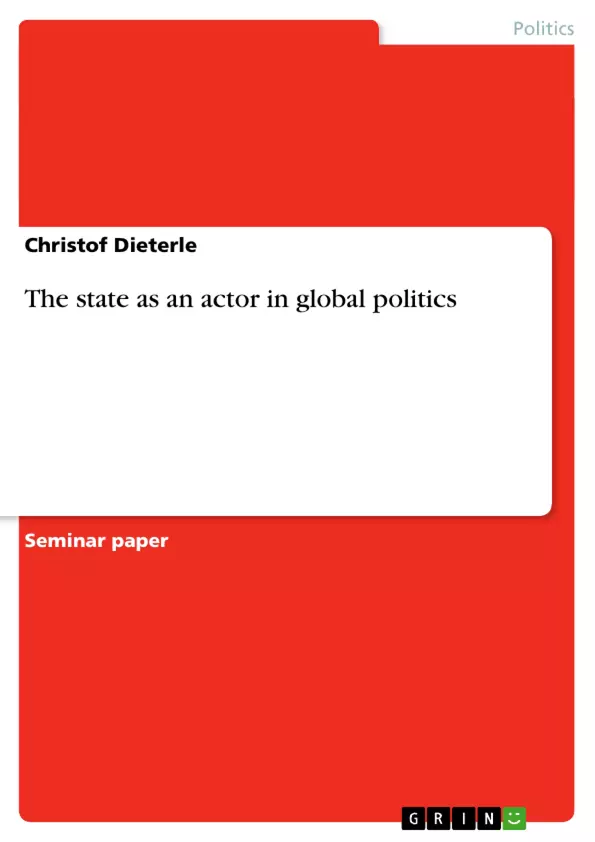Introduction
As the title of this paper suggests, the state is seen by many scholars as the central actor as far as global politics is concerned. Some see it weakened, some see it transformed, and others do not seem to observe any substantial change at all. This paper is intended to give a brief – and by no means comprehensive – overview on the current discussions in the field. In the first part of this paper I will examine the main arguments put forward by different scholars. I will do so by dividing them up into three categories: 1) advocates of the “weakened state”, 2) advocates of the “transformed state” and 3) advocates of the “unchanged state”. In the second part I will include a very different scholarly approach, namely that the state is the wrong unit of analysis as far as global politics is concerned and thus the question of its transformation or weakening is of little interest for the analysis of politics on a global level. The third and last part consists of a brief summary of the observations made in the previous chapters and ends with some conclusions drawn from these observations.
Inhaltsverzeichnis (Table of Contents)
- Introduction
- Three Approaches to the Nature and Role of the State
- Advocates of the “weakened state”
- Advocates of the “transformed state”
- Advocates of the “unchanged state”
- A Different Approach
- Conclusion
Zielsetzung und Themenschwerpunkte (Objectives and Key Themes)
This paper explores the ongoing debate concerning the state's role in global politics, analyzing arguments regarding its potential weakening, transformation, or sustained relevance. It aims to provide a concise overview of the current scholarly discussion on this topic, without aiming for a comprehensive analysis.
- The evolving nature of the state in the context of globalization.
- Competing perspectives on state power and influence in a globalized world.
- The impact of various actors, including international organizations and civil society, on state authority.
- The shifting relationship between states and markets in a globalized environment.
- The significance of the state in providing stability and security for global actors.
Zusammenfassung der Kapitel (Chapter Summaries)
- Introduction: This chapter introduces the paper's focus on the state's role in global politics, highlighting the varying perspectives on its potential weakening, transformation, or sustained relevance. It outlines the paper's structure, emphasizing the examination of different scholarly approaches and the presentation of a contrasting perspective.
- Three Approaches to the Nature and Role of the State: This chapter explores three distinct perspectives on the state's role in global politics:
- Advocates of the “weakened state”: This section examines scholars who argue that the state has lost power in global political decision-making processes, citing examples such as the increasing influence of international financial institutions.
- Advocates of the “transformed state”: This section discusses scholars who contend that the state has undergone a transformation rather than a decline in power, highlighting new forms of regulation and cooperation between states.
- Advocates of the “unchanged state”: This section explores scholars who maintain that the state's role and influence in global politics remain largely unchanged.
- A Different Approach: This chapter presents an alternative perspective, arguing that the state is not the appropriate unit of analysis for global politics, suggesting that its transformation or weakening is not a central concern.
Schlüsselwörter (Keywords)
The paper focuses on key concepts related to the state's role in global politics, including globalization, state power, authority, transformation, international organizations, civil society, markets, and global governance.
Frequently Asked Questions
What is the central focus of this paper?
The paper explores the ongoing debate regarding the state's role as a central actor in global politics in the context of globalization.
What are the three main approaches to the role of the state?
The three categories discussed are: advocates of the "weakened state", advocates of the "transformed state", and advocates of the "unchanged state".
What does the "transformed state" perspective suggest?
This view argues that the state has not declined in power but has undergone a transformation, adopting new forms of regulation and international cooperation.
Why do some scholars argue the state is the wrong unit of analysis?
Some scholars believe that global politics should be analyzed through different lenses, making the question of state transformation less central to understanding political reality.
How does globalization impact state authority?
Globalization creates a shifting relationship between states and markets, and increases the influence of international organizations and civil society on traditional state power.
Is the state still relevant for security and stability?
Yes, many scholars maintain that the state remains a significant actor for providing stability and security for various global actors.
- Citar trabajo
- Christof Dieterle (Autor), 2004, The state as an actor in global politics, Múnich, GRIN Verlag, https://www.grin.com/document/28061



